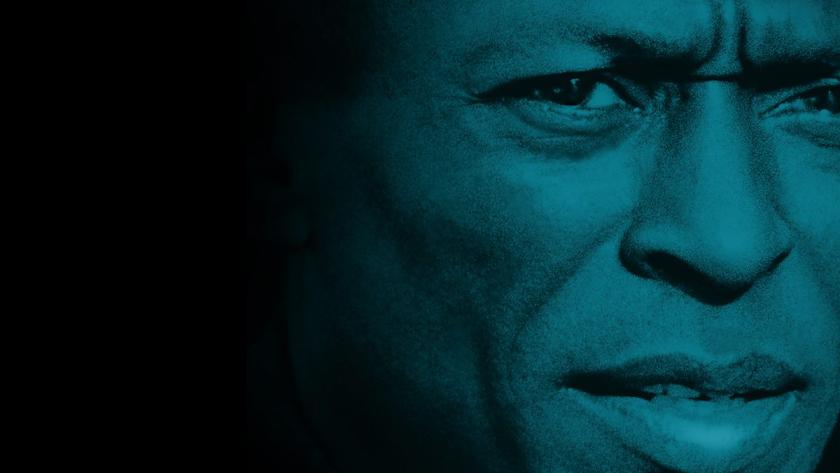Miles – where to begin? Some 21st century revisionists find his art fatally tainted by his personal life, and his violent behaviour in relationships. His rasping, epithet-scarred voice, the sound of a snake sloughing off its own skin, able to weaponise ‘motherfucker’ to some kind of deadly bio-mass, his long rich history of drug use and abuse, his vivid, aggressive take on race relations and his studied indifference to his audience – this is not how musicians and artists are supposed to behave, especially nowadays.
Miles Davis comes from a creative and political world that is the polar opposite of taking care of your fans. Famously, there was no smiling on the bandstand. He’d turn his back on you as soon as look at you, play the opposite of what you thought you wanted to hear. Loved his ballads? He’d give you Bitch’s Brew or On The Corner instead. The music critics hail today was often hated and slated when it came out. Miles didn’t appear to care. It wasn’t in his nature. He had his own stuff to take care of. Born upper middle class, into a family with servants, and horses, and land, he was his own man as a young kid, playing professionally as a teenager, and learning from Bird and Dizzy in the crucible of New York’s jazz clubs, legendary names all, just a few years later.
The stills and footage from this period, the 1940s and 1950s through the zenith of Kind of Blue, the first great Quintet, Sketches of Spain and the second great Quintet of the Sixties with Shorter, Hancock, Williams, and Carter, comprises some of the most compelling in Stanley Nelson’s extensive, authorised, feature-length documentary biography of the man, available on iPlayer and recently broadcast on BBC4.
If you’ve read Miles: The Autobiography, penned by Quincy Troupe from tapes he made with Miles (which actor Carl Lumbly voices here in a good imitation of raspy Miles-speak) you will know the story that unfolds on screen pretty well. Quite a lot of the performance footage is fairly familiar – there were only so many TV shows that Miles ever agreed to go on – but there is plenty of rare and unseen stuff here too, including 16mm home movies of Miles boxing and on the beach, and a beautiful sequence of Miles being filmed as he watches the rushes of Lift to the Scaffold, and creates, there and then, that film’s achingly gorgeous soundtrack. Juliette Greco recalls their great love, and pianist René Urtreger reflects in wry wonder at his passing through Miles’ jet stream. It's these close-up moments of intimate revelation that really make this film.
I’m a big fan of his post In A Silent Way music, and while plenty of performance footage exists for this era, relatively little makes it into the cut here, which is a shame – fans of the wild, dense Seventies recordings should look out instead for the 2004 documentary, Electric Miles. The The film addresses his toxic behaviour in relationships through the experience of his second wife, the dancer Frances Taylorfinal concert in Montreaux, with Davis revisiting his past for the first and only time in his career, is evoked succinctly by its producer, Quincy Jones, and throughout there are engaging testimonies from the musicians and producers who knew and worked with him – from Jimmy Heath, Jimmy Cobb and Gil Evans to Wayne Shorter and Herbie Hancock. They all have a pretty good Miles Davis impression, too.
The film addresses his toxic behaviour in relationships through the experience of his second wife, the dancer Frances Taylor – a superb stoyteller. She describes her utter shock when he punched her in the face after she remarked on Quincy Jones’ good looks after a party. “That was the first, and it wasn’t going to be the last, unfortunately”. She pins a lot of that behaviour down to the drugs and medication he was pumped up with. She loved him, but still, she left him. Interviewed in her eighties, she confidently agrees with Miles’ post-break-up regret that ‘anyone who was with Frances was one luck motherfucker”. “He was right,” she purrs. And she absolves him.
You can’t get away from it – he could be a violent, cruel man, but does that take away the music, its tenderness and empathy? There may never be an end to the no-platforming debate over great artists’ bad behaviour – posthumous Picasso has taken flak in this area – but the ugly side of Miles the man falls into sharp relief against the lyrical beauty, power and confessional fragility of his playing. Birth of the Cool generously and insightfully accommodates the flawed man while celebrating the flawlessness of his greatest art. It sends you back to the music, and that is what matters after the life is done.














Add comment